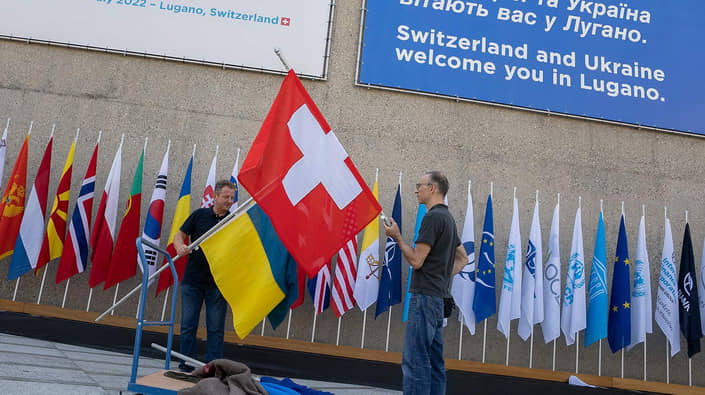Swiss Propaganda-Driven Vote? Why Should We Unblock Assistance Package for Ukraine

98 members of the lower chamber of the Swiss parliament were enough to block the passage of a new Swiss aid package to Ukraine. This is significant, because it is a missed opportunity to send a signal of solidarity to the people of Ukraine.
Switzerland is not a belligerent country; if its history tells anything about the country, it is that it knows how to handle humanitarian response to the catastrophe that a war brings upon civilians and fighting forces, a fortiori in the case of a war of aggression. In the context of the war against Ukraine, the Swiss parliament is presented a golden opportunity to allow the country to live up to expectations, in addition to the efforts already undertaken (including thanks to the Ukraine Recovery Conference hosted in Lugano in July 2022, which led to the adoption of the Principles of Lugano for the said recovery).
And Switzerland’s committed to Ukraine is not recent; its presence has started in the 1990s.
The proposal to Parliament is fairly straightforward: in view of Switzerland’s long-standing and existing commitments, it should contribute by a minimum of 5 billion Swiss francs (approximately 4.8 billion Euro) over the next five to ten years, to provide humanitarian aid, support the protection of civilians, and promote peace and reconstruction.
The obvious difficulty with such parliamentary processes, as the government highlighted, is that they precede a coordinated needs-assessment. Yet, the majority of the standing committee on foreign affairs of the lower chamber, which supported the proposal initially brought forward by Geneva Green MP Nicolas Walder, considered the signal more important than ever.
The signal matters indeed.
According to the Kiel Institute for World Economy, by GDP Switzerland stands in a sad 32nd place of donor countries to Ukraine, far behind its neighbour, and neutral like-minded country, Austria, which finds itself at the 15th position.
If there for sure are good reasons to refuse to set in stone how much a country should or should not contribute over a fix period of time in humanitarian efforts, without knowing what the situation on the ground will be in the said timeframe, the weight of the signal for the Ukrainian people should have mattered more in the consideration of the majority of the lower chamber of parliament.
The debate in parliament was not about Russia’s military aggression against Ukraine; most MPs who took the floor underlined they recognised that Russia is violating international law and started a war against a sovereign nation.
The main argument against voting in favour of the aid package was a financial one. Switzerland’s consolidated public finances (federal government, cantons, communes, and social security system) have been in surplus for a number of years and its debt is low in international comparison. Furthermore, the public deficit in 2021 was only negative by 0.5% of the GDP, reflecting the positive financial situation. In view of its dept-to-GDP, Switzerland ranks much better internationally with a 41.4% in 2023 than its contributions to Ukraine…
The financial argument is hence quite weak – or naive or egoist, one can choose for oneself.
We should therefore not be naive about Russia’s influence on Swiss politics either, as the Blick recently reported, and I made clear in the past. For them, the signal was not to be sent in favour of the victims of this war, but towards the tormentors.
MP Yvette Estermann is a good illustration of how one takes over Russia’s narrative. She firstly spoke about a "crisis" rather than a "war," as highlighted by the foreign policy advisor of the Greens, Raphael Noser. She then compared the "crisis" in Ukraine to "construction works" existing in Switzerland, such as the financing of the retirement system, and suggested, Switzerland cannot commit financially to both.
Do not get me wrong; we should not suggest that 98 MPs voted in favour of Russia’s propaganda. But we must make clear; whatever grounds on which MPs of good faith voted against this proposal serve Russia’s narrative, justification of violation of international humanitarian law, and does not show solidarity to the Ukrainian people under siege and shelling, yet living with great strength.
A few days before President Zelensky is to address the Swiss Parliament, the lower chamber missed the opportunity to stand up for Ukraine, but the higher chamber will this week have the opportunity to correct course.
The debate and vote in the Senate is to take place on Monday afternoon and one must hope that the eyes of Moscow observing the Swiss Parliament’s decision will make well-intended Senators perceive that voting in favour of this aid package sends a signal worth the money against the sense of impunity which nourishes the warlords in the Kremlin, notwithstanding all Swiss efforts already undertaken to support affected civilians and strengthen national and international accountability mechanisms.

by Florian Irminger
Former Secretary General, Swiss Greens,
President & Founder, Progress & Change Action Lab